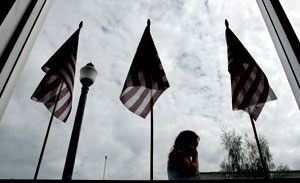The presidential campaign of presumptive Democratic nominee Barack Obama is making good on its promise to wage a serious battle to win Montana in November. In Flathead County alone, the Obama campaign has three offices, in Whitefish, Bigfork and Kalispell. Thirteen other Obama campaign offices dot the state, stretching as far east as Glendive and Wolf Point, with more openings promised in coming months.
“It appears to be the most organized political effort I’ve ever seen,” Gov. Brian Schweitzer, a Democrat, said in a conference call last week where he joined Obama’s Montana campaign staff to outline how the Illinois senator could win here.
But while the Obama campaign touted its growing organization in Montana, a recent poll shows that his lead in the state has evaporated over the last month. A July 29 Rasmussen poll shows presumptive Republican nominee John McCain gained six percentage points against Obama in July, putting the two candidates in a statistical dead heat, with 45 percent of polled Montanans saying they preferred McCain, while 44 percent supported Obama. A July 1 Rasmussen poll showed Montanans preferred Obama, 48 percent to 43 percent.
Democrats delight in pointing out that Obama has made four appearances in Montana over the last year, and the last time McCain visited the state was in 2000 to campaign for former Sen. Conrad Burns.
McCain’s current effort in Montana thus far is considerably less visible than his opponent’s. Earlier this month the GOP announced it was opening five campaign offices throughout the state that would operate with joint financing from the presidential campaign, along with statewide and local legislative campaigns. One office is located in Kalispell – an area of the state where posters and bumper stickers for Texas Congressman Ron Paul still vastly outnumber displays of support for McCain.
The question of whether Montana matters in this presidential election has long been answered in the affirmative. Mike Dorsey, state director for Obama, noted that had Al Gore won Montana’s three electoral votes in 2000, he would have won the election. The overwhelming question, and the one that remains unknown until Election Day, is whether the Obama campaign’s gamble in Montana will pay off – or if a McCain victory here affirms the state as a stronghold for Republican presidential candidates.
 |
|
A pedestrian passes American flags decorating Obama’s Kalispell headquarters. |
Demonstrating his typically keen understanding of the Montana electorate, Schweitzer signaled what are likely to be the two fundamental issues for the state’s voters by focusing his praise for Obama on two areas: guns and energy.
“I’m in sync with him on his energy plan,” Schweitzer said, while attempting to neutralize criticism of Obama’s voting record on gun rights issues by noting that McCain’s wasn’t much better. (The National Rifle Association has given McCain a grade of C on gun rights, while Obama received an F.)
“He ain’t gonna take your guns away,” Schweitzer said of Obama, going on to suggest that voters concerned solely with gun rights should come out to the polls to support him in his re-election bid, and if they dislike McCain and Obama, they could vote for Libertarian candidate Bob Barr – whose NRA grade is an A-plus.
A spokesman for the gun rights group, however, quickly disputed that assertion, saying Obama is trying to mislead Montanans about his previous support for gun-control measures.
Dorsey said the Obama campaign has so far amassed 14,000 volunteers, and it intends to deploy them around the state in “neighborhood teams” to encourage the nearly 200,000 unregistered Montanans to register to vote, and eventually contact every eligible voter in the state. Dorsey repeatedly referenced the campaign’s voter registration drive during the primary contest in Iowa as a key reason behind victory there. With Schweitzer’s 2004 victory margin of 19,703 votes, and Democratic U.S. Sen. Jon Tester’s 2006 victory margin of 3,562 votes, Dorsey noted 200,000 new voters could easily overturn Montana’s preference for Republican presidents.
Unmentioned, however, was Pres. Bush’s Montana victory in 2004, where he took 59 percent of the vote, defeating John Kerry by a margin of 92,353. Republicans make clear they expect more of the same in November, attacking Obama on the very issues Schweitzer sought to emphasize.
“No amount of offices will change the fact that Barack Obama strikes out with Montana voters on energy, taxes and gun rights,” Bill Riggs, Republican National Committee spokesman, said. “Montana voters will elect John McCain in November based on his strong record for gun rights, his ‘all-of-the-above’ energy plan, and his steadfast commitment to low taxes and reduced spending.”
Jake Eaton, executive director of the state GOP, said the Republicans are running a ground operation with less paid staff than Democrats, and are relying heavily on volunteers to get more done with a leaner operation.
“(Obama’s) got to make that kind of investment just to get to where he seems to have a chance,” Eaton said, and pointed to Obama’s recent slip in the polls as evidence that the GOP’s strategy is working. “With Sen. Obama, the more Montanans learn about him, the less they’re going to like him.”
Eaton acknowledged that across the country, Republican candidates face a tough electoral landscape, but in Montana, the only sure thing is that voters are not swayed by national trends.
“There’s no question that nationally the Republican brand is not at its peak, but I don’t know how much that plays into Montana,” Eaton said. “I don’t think it’s going to have a tremendous impact on the presidential race in Montana.”
It remains to be seen if Obama’s offensive gambit in Montana pays off, but should the general election turn out anything like the extraordinarily tight Democratic primary, then either candidate would be foolish to take for granted the three little electoral votes up for grabs from this very big state.